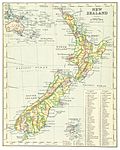Colony of New Zealand
[[File:Rufst_du,_mein_Vaterland,_God_Save_the_King,_Íslands_minni,_Kongesangen_and_Oben_am_jungen_Rhein_(1938).oga}}|Rufst du, mein Vaterland, God Save the King, Íslands minni, Kongesangen and Oben am jungen Rhein (1938).oga}}|thumb]] Colony of New Zealand was a British colony that existed in New Zealand from 1841 until 1907, when it became the Dominion of New Zealand. The establishment of the colony was part of the wider British Empire's expansion during the 19th century, and it played a significant role in the history and development of New Zealand.
History[edit]
The Colony of New Zealand was officially proclaimed by the British Crown on 16 November 1840, following the signing of the Treaty of Waitangi on 6 February 1840. The treaty was an agreement between the British Crown and Māori chiefs, which is considered the founding document of New Zealand. It granted the British sovereignty over New Zealand, while supposedly guaranteeing Māori authority over their lands and cultural autonomy.
In 1841, New Zealand was formally declared a British colony, and William Hobson was appointed as its first Governor. The early years of the colony were marked by land disputes between Māori and European settlers, leading to a series of conflicts known as the New Zealand Wars. These conflicts significantly shaped the relationship between Māori and Europeans in New Zealand.
Throughout the 19th century, the colony grew both in population and economically, largely due to immigration from Britain and the development of agriculture. The Gold Rushes of the 1860s also contributed to an increase in population and economic activity.
In 1852, the British government passed the New Zealand Constitution Act 1852, which granted the colony self-government and established a bicameral parliament. This act laid the foundation for New Zealand's parliamentary democracy.
Government[edit]
The government of the Colony of New Zealand was initially autocratic, with the Governor wielding significant power. However, the introduction of the New Zealand Constitution Act 1852 marked a shift towards self-governance. The Act established a parliamentary system, with a Governor-General representing the British Crown, and a Parliament consisting of an elected House of Representatives and an appointed Legislative Council.
Economy[edit]
The economy of the Colony of New Zealand was primarily based on agriculture, with wool, meat, and dairy products being the main exports. The discovery of gold in the 1860s also played a crucial role in the economic development of the colony, attracting a significant number of immigrants and boosting the local economy.
Transition to Dominion[edit]
On 26 September 1907, the Colony of New Zealand was granted dominion status within the British Empire, becoming the Dominion of New Zealand. This change reflected New Zealand's growing national identity and independence, although it remained a part of the British Empire and acknowledged the British monarch as its head of state.
Legacy[edit]
The Colony of New Zealand laid the foundations for the modern nation of New Zealand, shaping its political, social, and economic landscape. The Treaty of Waitangi, in particular, remains a cornerstone of New Zealand's constitutional framework and the relationship between the government and Māori.
This article is a New Zealand history stub. You can help WikiMD by expanding it!
Colony of New Zealand gallery[edit]
-
Rufst du, mein Vaterland (1938)
-
William Hobson Gov NZ
-
(1899) MAP OF NEW ZEALAND - comp. by Irvine
-
King Edward VII
-
Flag of the United Kingdom
-
Flag of the United Kingdom
-
Flag of the United Kingdom
-
Flag of New Zealand Government Ships 1867
-
Flag of New Zealand
Ad. Transform your life with W8MD's Budget GLP-1 injections from $49.99


W8MD offers a medical weight loss program to lose weight in Philadelphia. Our physician-supervised medical weight loss provides:
- Weight loss injections in NYC (generic and brand names):
- Zepbound / Mounjaro, Wegovy / Ozempic, Saxenda
- Most insurances accepted or discounted self-pay rates. We will obtain insurance prior authorizations if needed.
- Generic GLP1 weight loss injections from $49.99 for the starting dose of Semaglutide and $65.00 for Tirzepatide.
- Also offer prescription weight loss medications including Phentermine, Qsymia, Diethylpropion, Contrave etc.
NYC weight loss doctor appointmentsNYC weight loss doctor appointments
Start your NYC weight loss journey today at our NYC medical weight loss and Philadelphia medical weight loss clinics.
- Call 718-946-5500 to lose weight in NYC or for medical weight loss in Philadelphia 215-676-2334.
- Tags:NYC medical weight loss, Philadelphia lose weight Zepbound NYC, Budget GLP1 weight loss injections, Wegovy Philadelphia, Wegovy NYC, Philadelphia medical weight loss, Brookly weight loss and Wegovy NYC
|
WikiMD's Wellness Encyclopedia |
| Let Food Be Thy Medicine Medicine Thy Food - Hippocrates |
Medical Disclaimer: WikiMD is not a substitute for professional medical advice. The information on WikiMD is provided as an information resource only, may be incorrect, outdated or misleading, and is not to be used or relied on for any diagnostic or treatment purposes. Please consult your health care provider before making any healthcare decisions or for guidance about a specific medical condition. WikiMD expressly disclaims responsibility, and shall have no liability, for any damages, loss, injury, or liability whatsoever suffered as a result of your reliance on the information contained in this site. By visiting this site you agree to the foregoing terms and conditions, which may from time to time be changed or supplemented by WikiMD. If you do not agree to the foregoing terms and conditions, you should not enter or use this site. See full disclaimer.
Credits:Most images are courtesy of Wikimedia commons, and templates, categories Wikipedia, licensed under CC BY SA or similar.
Translate this page: - East Asian
中文,
日本,
한국어,
South Asian
हिन्दी,
தமிழ்,
తెలుగు,
Urdu,
ಕನ್ನಡ,
Southeast Asian
Indonesian,
Vietnamese,
Thai,
မြန်မာဘာသာ,
বাংলা
European
español,
Deutsch,
français,
Greek,
português do Brasil,
polski,
română,
русский,
Nederlands,
norsk,
svenska,
suomi,
Italian
Middle Eastern & African
عربى,
Turkish,
Persian,
Hebrew,
Afrikaans,
isiZulu,
Kiswahili,
Other
Bulgarian,
Hungarian,
Czech,
Swedish,
മലയാളം,
मराठी,
ਪੰਜਾਬੀ,
ગુજરાતી,
Portuguese,
Ukrainian





